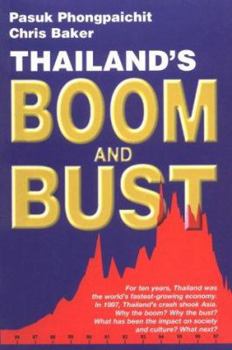Thailand's Boom and Bust: Revised Edition
Select Format
Select Condition 
Book Overview
Completely revised since its first publication in 1996, this book is about the transformation of a country over one roller-coaster decade. It is about the econoics of boom and bust, but also about... This description may be from another edition of this product.
Format:Paperback
Language:English
ISBN:9747100576
ISBN13:9789747100570
Release Date:January 1998
Publisher:Silkworm Books
Length:372 Pages
Weight:1.05 lbs.
Dimensions:0.8" x 5.6" x 8.3"
Customer Reviews
2 ratings
Hot money, IMF Bank of Thailand bailout
Published by Thriftbooks.com User , 18 years ago
The IMF is like a credit union for countries. Each member makes a deposit of which 25% must be in the form of Gold or hard currency, this is called their quota. A member may receive a loan up too three times their quota amount. In an emergency the IMF could approve loans that exceed the 3X quota amount. The IMF central role is too provide policies and resources that give confidence to its members, make available emergency funds offsetting a financial panic, correct maladjustments in balance of payments between nations, and preventing destruction of national and international stability. IMF credibility is their contrarian's superiority providing advice and mandating policies forcing troubled countries too become more efficient and less corrupt. These governments would maintain their control over capital control. However, IMF can not control the inflow and outflow of foreign money. Fast growing countries like Thailand opened their financial systems to hot money. Hot money characteristics were a temptation that could turn into a panic because the money could be quickly be liquidated as a punishment for underperformance. In the 90s, emerging markets trend was towards ending capital controls. Banks were acting strangely. Banks were increasing loans, at the same time as, the portfolio investors were retreating and selling out positions. 1992, the US Treasury Bond was below 6%. Investors were tempted by yield chasing seeking double digit yields in Malaysia. Japan was one of the strongest investor. Many of these investors borrowed low cost money from home markets and invested it into higher yield emerging market securities capturing 15 to 23% yields. This sets the stage for disaster in Thailand. 1997, Thailand central bank was armed with $38 billion in reserve dollars. The Thailand central bank believed $38 billion was more money than the speculator would be willing to bet against the baht. But through 1997, speculation increased against the baht as investors borrowed money to sell short on the currency betting that the currency would drop and they could buy back at cheaper levels. The Thailand central bank could defend the baht by raising interest rates increasing bond and bank deposit appeal. The second way to defend the Baht was to enter foreign currency exchanges and pump up the demand for the currency. The Bank of Thailand did a lot of buying because it was obligated to keeping the exchange of one dollar to 25 baht. Buying baht reduced the amount of Baht in circulation in the Thailand economy. The Bank of Thailand was too clever by engaging in a currency swap. A swap involves a promise by participates too buy or sell a currency for another with a promise to trade the currencies back after a certain amount of time. The Bank of Thailand swap secretly amount to $23 billion. The Bank of Thailand reported that they had plenty of dollars for business. Problem solved! However, when the swap reversed the Thailand bank would be scarce of dollars to mak
Clear, Well Written, Insightful and Comprehensive
Published by Thriftbooks.com User , 25 years ago
This is the most interesting and easily read book I have ever come across dealing with issues of economic and political development. Thai politics and economics are complex and confusing. This book makes sense of the conflicting strains in Thailand and will enable even a novice to makes sense of of information from Thai newspapers. Fascinating for anyone interested in global economics or Thai culture.





